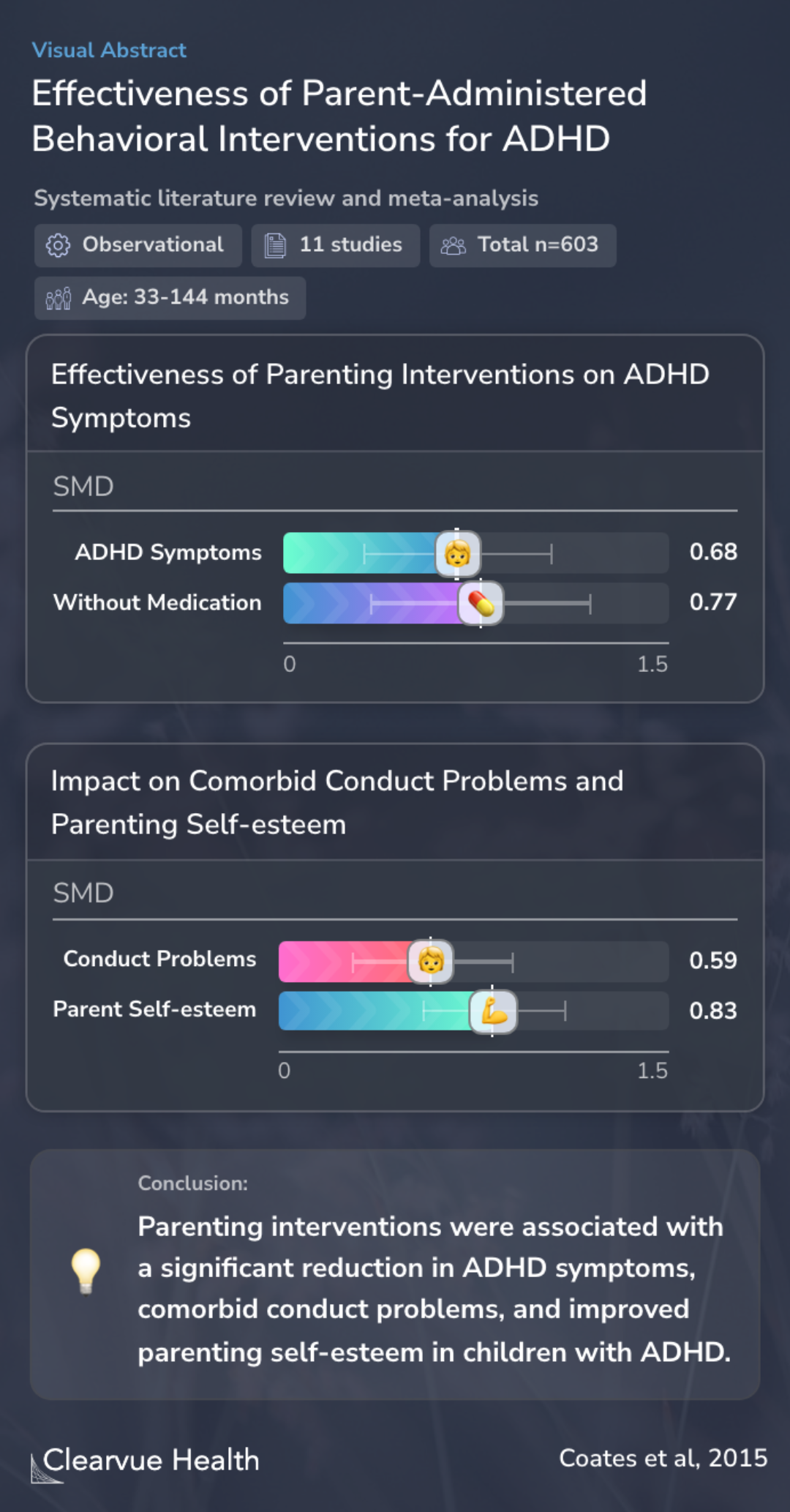Parenting Interventions for ADHD: A Systematic Literature Review and Meta-Analysis
Effectiveness of Parent-Administered Behavioral Interventions for ADHD
Coates J, Taylor JA, Sayal K

Objectives
The paper set out to assess how well interventions led by parents work for kids with ADHD.
To evaluate the evidence base relating to the effectiveness of parent-administered behavioral interventions for ADHD.
Methods
The team looked at many studies, picking only those that were set up in a way that would give clear answers. They focused on the changes seen in kids right after these programs ended.
A systematic review of randomized controlled trials or non-randomized but adequately controlled trials for children with ADHD or high levels of ADHD symptoms was carried out across multiple databases. For meta-analyses, the most proximal ratings of child symptoms were used as the primary...
Results
They found 11 studies that fit their criteria, involving 603 kids aged between about 2.5 and 12 years. The interventions by parents really did help lessen ADHD symptoms in kids, showing a moderate level of success. This held true even when they didn't consider studies where kids were also taking medication. Besides, these programs also helped with other behavior problems kids had and made parents feel better about their parenting skills. However, the study didn't find any significant improvements in parents' stress or their negative behaviors towards their kids.
Eleven studies met inclusion criteria (603 children, age range = 33-144 months). Parenting interventions were associated with reduction in ADHD symptoms (Standardized Mean Difference [SMD] = 0.68; 95% confidence interval [CI] [0.32, 1.04]). There was no evidence of attenuation of effecti...
Evidence Comparison
The study's findings align with current evidence on the effectiveness of parent training in behavior management (PTBM) as a primary intervention for preschool-aged children with ADHD. They reinforce the importance of involving parents and educators in the treatment process to help reduce disruptive behaviors. The study found no evidence of reduced effectiveness when excluding studies where medication was also used, suggesting that parenting interventions can be beneficial both in combination with medication and as a standalone treatment. Overall, the study's results support the current practice guidelines recommending PTBM as a key component in the management of ADHD in young children.
Conclusions
The study's findings support clinical practice guidelines and suggest that parenting interventions are effective in reducing ADHD symptoms, comorbid conduct problems, and improving parenting self-esteem in children with ADHD. The authors emphasize the need to ensure the availability of parenting interventions in community settings to make these evidence-based treatments more accessible to families.
These findings support clinical practice guidelines and suggest that parenting interventions are effective. There is a need to ensure the availability of parenting interventions in community settings.
Key Takeaways
Context
The current study focuses on the effectiveness of parent-administered behavioral interventions for children with ADHD. To further explore the role of different treatment approaches, readers might be interested in the study by Abikoff et al. (2004) titled "Social functioning in children with ADHD treated with long-term methylphenidate and multimodal psychosocial treatment." This study investigated whether combining ADHD medication with specialized social skills training could help children with ADHD improve their social functioning. The findings suggested that adding social skills training to medication did not significantly enhance children's social skills, indicating that medication alone might be sufficient for addressing social difficulties in children with ADHD.
Another related topic of interest for parents of children with ADHD is how to help their child stay more organized. Children with ADHD often struggle with organization, time management, and planning compared to their peers, which can lead to difficulties in completing tasks and remembering important details. These organizational challenges can negatively impact school performance, resulting in issues such as forgotten assignments, misplaced materials, and procrastination. Simple techniques like brief to-do lists, managing hyperfocus, and using visual reminders can be effective in helping individuals with ADHD manage their daily tasks. Exploring strategies to support organization skills can be a valuable complement to the parenting interventions discussed in the current study.